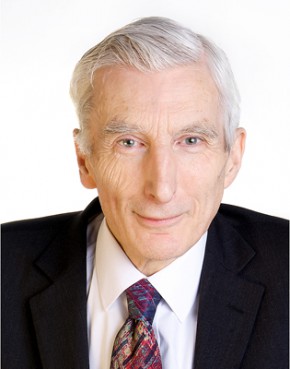
(RNS2-APR06) Martin J. Rees of Cambridge University is the winner of the 2011 Templeton Prize for advances in science and religion. For use with RNS-TEMPLETON-PRIZE, transmitted April 6, 2011. RNS photo courtesy John M. Templeton Foundation.
(RNS) A British theoretical astrophysicist who has achieved renown for his study of the cosmos and for sounding warnings about the future of humanity has won the $1.6 million 2011 Templeton Prize.
Martin J. Rees of Cambridge University, a former president of Britain’s prestigious Royal Society, was announced the winner on Wednesday (April 6) by the John Templeton Foundation.
The annual prize honors an individual who has made “exceptional contributions to affirming life’s spiritual dimension.” Rees is a somewhat unorthodox choice because he holds no formal religious beliefs.
Rees, 68, has long studied questions surrounding black holes, the big bang and what some call the “dark age” of the early universe. Rees has also speculated on the idea of infinite universes, sometimes called “multiverses,” and has pondered how large physical reality actually is.
Rees has helped reshape “crucial philosophical and theological considerations that strike at the core of life, fostering the spiritual progress that the Templeton Prize has long sought to recognize,” the Templeton Foundation said in announcing the prize.
“The questions Rees raises have an impact far beyond the simple assertion of facts, opening wider vistas than any telescope ever could,” said John M. Templeton, Jr., president and chairman of the John Templeton Foundation started by his father.
“By peering into the farthest reaches of the galaxies, Martin Rees has opened a window on our very humanity, inviting everyone to wrestle with the most fundamental questions of our nature and existence,” he said.
In recommending Rees for the honor, Robert Williams, president of the International Astronomical Union, said Rees “is very unusual in that he constantly touches on spiritual themes without dealing explicitly with religion. I do not know whether he is a theist, for example.”
In an interview, Rees acknowledged he holds no formal religious beliefs, but honors the traditions of the Anglican Church as a member of his “tribe.”
“I do participate in services because I value them for their aesthetic and social value,” he said.
Rees has won notoriety as a scientist concerned with the survival of the planet. In a 2004 book, published in the United States as “Our Final Hour,” Rees argued that civilization likely will suffer a severe setback in the next century. He argued that humans, with their interconnected world vulnerable to disruption, have no more than a 50-50 chance of surviving until 2100 without some sort of serious event or problem linked to technology or the environment.
Though hopeful about what science and technology can do to improve life, “in terms of politics, I am not optimistic.”
In remarks prepared for Wednesday’s announcement in London, Rees said the “intractable politics and sociology — the gap between potentialities and what actually happens — engenders pessimism.”
“All too often the focus is short term and parochial — the urgent and the local loom higher on political agendas than even the gravest long-term challenges.”
The Templeton Prize is the world’s largest annual award to an individual and is intended to exceed the monetary value of the annual Nobel Prizes. Britain’s Prince Philip will award Rees the prize on June 1 at Buckingham Palace.
The Templeton Prize began in 1973 as an initiative by the late philanthropist and global investor Sir John M. Templeton. It was initially given to such religious figures as Mother Teresa and Billy Graham. In recent years, however, the prize has been awarded to scientists and theologians whose work focuses on the field of science and religion.




